Aggression in an Immersive Virtual Environment: Behavioral Strategies of Adolescents and the Bystander Effect
The spread of virtual reality technologies raises the question of the formation of new practices of digital sociality, including encountering destructive communication. The article is devoted to an experimental study of the behavioral reactions of adolescents acting as bystanders of cyberaggression situation in an immersive virtual environment, including depending on the differences in the expression of social responsibility and moral attitudes. Adolescents (N=50) were asked to complete a task to search for an object in the VRChat virtual environment, in which they faced a real-time cyberaggression situation. The participants of the experiment were divided into control and experimental groups, the members of the latter were additionally instructed to observe and maintain the rules of communication in the virtual environment. Two types of behavior were identified: “passive bystanders” (58%), who chose an avoidance strategy or engaged in communication only to solve the task and “active defenders” (42%), who were divided into aggressive and non-aggressive. It is shown that the choice of behavioral strategies aimed at helping the “victim” in a cyberaggression situation in virtual space is determined to a greater extent by such personal characteristics as the severity of social responsibility and the level of moral development, which make more important contribution to the regulation of social behavior, than by the instruction received “at the entrance to the situation” on the need to comply with the rules of positive culture communication. The social responsibility as a personal characteristic, as opposed to the phenomenon of diffusion of responsibility, revealed within the framework of the bystander effect, turns out to be more characteristic of the defenders of the “victim” and their prosocial role compared to passive observers.
Keywords
cyberaggression, behavioral strategies, bystander effect, defender, moral attitudes, social responsibility, virtual reality, adolescentsAuthors
| Name | Organization | |
| Soldatova Gaina U. | Lomonosov Moscow State University | soldatova.galina@gmail.com |
| Chigarkova Svetlana V. | Lomonosov Moscow State University | chigars@gmail.com |
| Nikonova Evgenia Yu. | Lomonosov Moscow State University | eniconova@mail.ru |
| Vinitskij Dmitriy A. | Laboratory of knowledge | fatrekrut@mail.ru |
| Popkov Artem E. | Lomonosov Moscow State University | 7451540@mail.ru |
References

Aggression in an Immersive Virtual Environment: Behavioral Strategies of Adolescents and the Bystander Effect | Sibirskiy Psikhologicheskiy Zhurnal – Siberian Journal of Psychology. 2022. № 86. DOI: 10.17223/17267080/86/2
